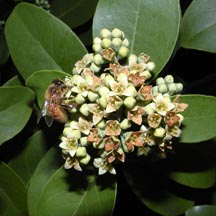
In the Garden![]()
Rick Barboza
'Iliahi
LATIN NAME
Santalum paniculatum
Description: Large bushy shrubs or trees up to 60 feet tall but usually 15 to 30 feet tall with elliptical pale green-blue leaves. Fragrant flower clusters are light green with hints of brown or orange. The plant's most appealing feature is its sweet-smelling heartwood, which retains the sandalwood smell for a long time.
Distribution: There are four species of sandalwood that are endemic to Hawaii and even more subspecies within each. This particular species is found only on the island of Hawaii, from barren lava fields through the dry forests all the way up to higher-elevation wet forests at around 6,000 feet.
HUI KU MAOLI OLA
Hawaiian sandalwoodCultural uses: The sweet-smelling wood of 'iliahi is used to scent kapa, and the flower clusters can be used in lei haku.
Landscape uses: You can plant 'iliahi in either full sun or partial shade in areas where it can be easily seen because you definitely want to show this buggah off. Also, plant it in the vicinity of other plants because all 'iliahi are parasitic. This means that in order for the plant to live a long, healthy life, its roots need to attach to the roots of another host plant, but don't worry, the 'iliahi won't kill the host plant. Some good host plants include koa, koai'a, 'ilima, ohai or 'ohi'a lehua. Very little watering is needed for this plant, especially once established.
Also: The sandalwood trade was one of Hawaii's first exploits. Started by Capt. John Kendrick, of Boston, it began in 1791 and lasted until about 1840 when the sandalwood was almost wiped out. It is estimated that 'iliahi sold for about $125 per ton and that the industry made an estimated $4 million.
Hawaiians were forced into labor, and the clearing of 'iliahi not only hurt the population of the plant, but also the morale of the people. There is documentation of the labor being so brutal to Hawaiian families that other family members not working on gathering the wood would actually pull out young sandalwood plants in hope that their loved ones wouldn't have to do it in the future.
Rick Barboza co-owns Hui Ku Maoli Ola, a native Hawaiian plant nursery, with Matt Schirman. Contact him at 259-6580 or e-mail rickbarboza@aol.com.
Gardening Calendar


